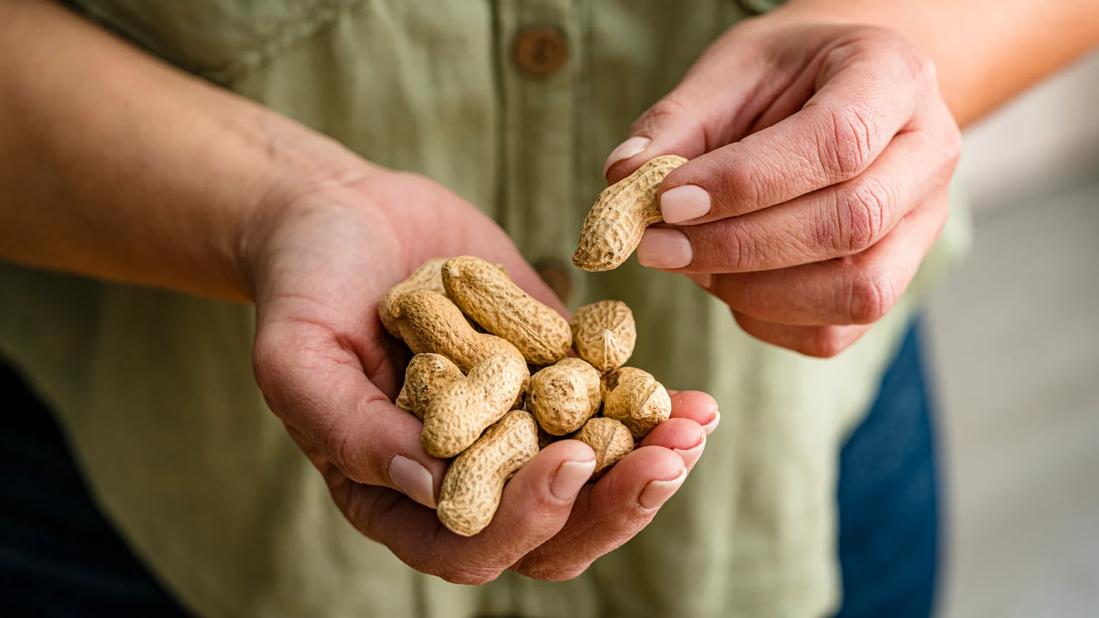This legume can reduce cholesterol and help with weight loss and healthy blood sugar levels

Image content: This image is available to view online.
View image online (https://assets.clevelandclinic.org/transform/97e4665d-0a6a-4860-9258-c82e2b1d60db/peanuts-1942033495)
Person holding handful of peanuts in shells
We tend to think of peanuts as nuts — it’s in the name, after all. But they’re actually legumes. They’re in the same family as chickpeas, lentils, peas and soybeans. But whatever we call them, peanuts are an abundant food. And for good reason.
Advertisement
Cleveland Clinic is a non-profit academic medical center. Advertising on our site helps support our mission. We do not endorse non-Cleveland Clinic products or services. Policy
“Peanuts are popular in many cuisines worldwide and in plant-based diets,” says registered dietitian Julia Zumpano, RD, LD. “They’re rich in healthy fats and protein, as well as several vitamins and minerals.”
Zumpano breaks down peanut health benefits.
An ounce (28 grams) of dry-roasted, without salt peanuts, which is about 28 shelled peanuts, provides:
An ounce of peanuts also provides these key nutrients:
Peanuts are a nutrient-dense food that offer some specific health benefits. Zumpano shares the top reasons why peanuts are good for you.
Antioxidants neutralize free radicals in your body. Free radicals are molecules that, in excess, can damage your cells in a process called oxidative stress. This damage plays a part in many disease processes and is thought to be what contributes to higher risk of chronic diseases.
Advertisement
“Antioxidants, like those found in peanuts, may help reduce the risk of a wide range of chronic diseases,” says Zumpano.
Peanuts are packed full of plant compounds and mineral antioxidants, including:
Eating peanuts and other nuts, like walnuts, almonds, cashews and pistachios, may help lower your cholesterol. The cholesterol-lowering property of peanuts may be due in part to their phytosterols.
“Phytosterols are compounds found in plants, and they’re similar in structure to cholesterol. When you eat phytosterols, they block the absorption of cholesterol in your digestive system, which can lower cholesterol levels,” explains Zumpano.
Even though peanuts are high in calories, research suggests that eating peanuts may help you maintain a healthy weight and avoid having obesity. “Peanuts also contain protein, fiber and healthy fats, which can make you feel full quicker and longer,” notes Zumpano.
Peanuts might even make weight loss more pleasant if you’re not a fan of low-fat diets, according to a study of people cutting calories to lose weight. Those who ate 1 ounce of peanuts before two meals each day lost around the same amount of weight as those on a low-fat diet.
All nuts help keep blood sugar steady, as they’re rich in fiber and protein and low in carbs. But what’s going on at a cellular level? A review of 40 different experiments found that eating peanuts and tree nuts may improve your insulin sensitivity. This means your body can use insulin more effectively.
But consuming peanuts isn’t likely to lower blood sugar directly. Rather, regularly eating peanuts is more likely to help prevent blood sugar problems in the long run.
“Normal blood sugar levels are a cornerstone to good health and lowering your risk of many chronic diseases,” says Zumpano.
Peanut butter is easily the most popular of all the nut butters. But is it healthy?
“In general, peanut butter has most of the same health benefits as peanuts,” reports Zumpano. “However, popular brands of peanut butter also contain added sugar and salt, which makes peanut butter less healthy than plain peanuts. To maximize the health effects, look for no-sugar, low-salt brands.”
Peanut allergies are common. This allergy response happens when your immune system mistakenly identifies the proteins in peanuts as harmful substances. These allergic reactions can be severe and even life-threatening for some people. Anyone with a peanut allergy should avoid peanuts, peanut butter and any foods that contain them.
Advertisement

Sign up for our Health Essentials emails for expert guidance on nutrition, fitness, sleep, skin care and more.
Learn more about our editorial process.
Advertisement
Pick bell peppers to help fight cancer, memory decline and joint pain
The tropical fruit is a good source of antioxidants and vitamin C
High amounts of cholesterol and saturated fat in red meat may be linked to heart disease
The leaves and pods from this tree are rich in essential nutrients
This starchy root vegetable is a staple in many global cuisines — but it has to be prepared correctly, or it can cause serious concerns
These delicate green sprouts can give you an extra dose of vitamin K and other nutrients — but they’re not safe for everyone
Edamame, lentils and chicken breast are good sources of protein
Eating this root vegetable can help support your eye, heart and brain health
Prioritize your health by managing stress, strengthening your social connections and getting quality sleep
Bolsters, blankets, pillows and blocks can offer extra support, stability and comfort
Allergies, postnasal drip, asthma or reflux could be to blame for a cough that won’t quit